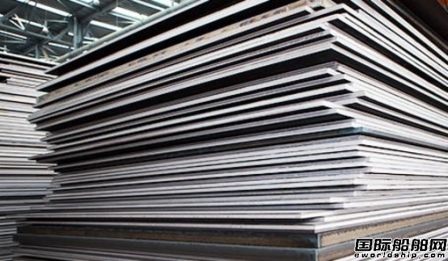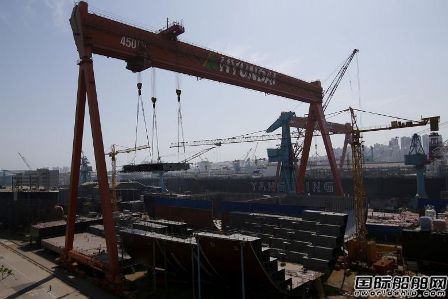
Current LocationïžHome - News - Industry

|
|||
| Publishedïž2021.01.04 News SourcesïžQingdao Gute Ship Supplies Co., Ltd. Viewsïž | |||
|
Steel prices are rising! South Korean shipping companies worry that the competitiveness of receiving orders will decline
The United States imposes additional countervailing duties on South Korean heavy plates, but has little effect on prices According to the South Korean media The Guru, the US Department of Commerce announced on December 29 last year (local time) that it would impose countervailing duties (CVD) on carbon alloy thick plates imported from South Korea. Among them, Hyundai Steel and Dongkuk Steel Thick plates were levied 0.5% and 0.28% tariffs respectively. CVD, also known as "offset tariff", is levied when the exporting country receives subsidies for the import of products, and the domestic industry suffers losses. At the request of domestic companies, the U.S. Department of Commerce conducted an investigation on products exported to or sold in the U.S. from South Korea from January 1 to December 31, 2018. According to the survey results, the US Department of Commerce believes that the South Korean government has given Hyundai Steel and Dongkuk Steel a subsidy equivalent to 0.5% and 0.28% of the plate price. It is reported that in March last year, when Hyundai Steel accepted the preliminary survey of the survey, the survey results showed that this ratio was 0.49%. Now the final official result has only increased by 0.01%, but it has reached countervailing duty (CVD) 0.5 % Recognition rate, so Hyundai Steel will enter the future US Department of Commerce CVD survey list. In addition, the CVD ratio of Dongkuk Steel's preliminary investigation was 0.15%, and the final result this time was determined to be nearly twice the result of the preliminary investigation. However, the U.S. Department of Commerce admitted that due to calculation errors in the investigation process, it finally decided to impose additional tariffs in accordance with the minimum standard of 0.28%. The U.S. Department of Commerce stated on the Dongkuk Steel Incident: âOur calculations on financial projects supported by the Korea Export-Import Bank (KEXIM) and the companyâs R&D (R&D) business preferential subsidies are inaccurate, but the minimum standards are allowed. CVD." An official from Hyundai Steel said: âAfter the US Department of Commerce has determined the CVD standard for heavy plates, it will impose additional taxes on products that have already been exported. However, the tariff rate imposed by the US this time is not high and will not have much impact on steel prices. " The soaring raw material prices push up the price of heavy plates, and South Korean shipping companies are suffering According to a report by "Korea Economics", people in the Korean steel industry said that due to the soaring prices of raw materials such as iron ore, Korean steel companies have long been "lack of making ends meet" for the production of heavy plates for ships, so the increase in steel prices is "urgent." In this context, the South Korean shipbuilding industry is worried that although South Korean shipbuilding companies have successively accepted a large number of new ship orders for a period of time at the end of 2020, and have reserved relatively rich "rations" for the next two years, the price of marine thick plates will increase. Increasing cost pressure has led to a decline in the order-taking competitiveness of the Korean shipbuilding industry. 
According to a source in the Korean steel industry, global iron ore prices reached US$176 per ton on the 21st of last month, the highest value since February 2013; they have risen by 41.9% in the last month. This is because the Chinese governmentâs economic stimulus policies have led to a surge in iron ore demand, and the spread of the new crown pneumonia epidemic has caused the production of major iron ore exporters Australia and Brazil to decrease. South Korean steel companies reported that in view of the increasing cost burden, they had to increase the prices of hot-rolled steel and heavy plates sold to steel distributors recently, and plan to continue to increase them in 2021. Among them, Pohang Steel has increased its price per ton by 30,000 won per ton since last month; Hyundai Steelâs shipping price per ton sold to steel distributors on the 1st and 14th of last month. Increased 30,000 won and 60,000 won. Thick plates are one of the most important raw materials for shipbuilding enterprises, accounting for about 15% to 20% of the total cost of shipbuilding. Therefore, shipyards are very sensitive to changes in the price of thick plates. In South Korea, steel companies will provide different shipbuilding companies with thick plates at different prices, and at the same time, they will negotiate the price of steel supply for different shipbuilding companies every six months. Every time when the "price adjustment season" of steel is approaching, steel companies and shipbuilding companies generally negotiate prices on a "one-to-one" basis. In 2008, the price of marine thick plates reached a high of over 1.1 million won/ton, which was also the result of the rising global raw material prices and the booming shipbuilding market at that time. However, as the shipbuilding industry has been sluggish for many years after the outbreak of the international financial crisis, the price of marine thick plates has also fallen. In 2017, it was almost "halved" to less than 600,000 won/ton. In response, South Korean steel companies stated that in view of domestic shipbuilding companies facing market depression and structural adjustments and other pressures that have caused operational difficulties, steel companies as the supplier have accepted shipbuilding companiesâ request for freezing or even lowering the price of heavy plates. Over the years, the low price has been maintained to provide shipbuilding companies with marine thick plates. At present, the price of Korean marine plate is maintained at 600,000 to 700,000 won per ton. But now, Korean steel companies can no longer ignore market factors such as rising prices of raw materials such as iron ore and the start of rising steel prices in China. Their current business policy is to "realize prices." It is reported that the current price of China's thick plate has hit its highest value in two years, reaching $600 per ton (about 660,000 won). A related person in the Korean steel industry said: âFor many years, the price of heavy plates has been lower than the production cost, which has caused the cost and selling price to be inverted. There has been a loss of hundreds of billions of won. Therefore, it is imperative to raise the steel price. However, considering the difficulties of the shipbuilding industry , We have minimized the price increase; at the same time, the Korean shipbuilding industry is receiving more orders, so it is absolutely necessary to increase the price of heavy plates." In this regard, a person from the Korean shipbuilding industry said: âThe three major shipping companies in South Korea have just signed a large number of new ship contracts. It should have been happy, but the price increase of the steel companies is surprising, because it will take two to three years for the shipbuilding orders to be fully realized. The increase in the price of heavy plates may lead to a decline in the competitiveness of South Koreaâs shipbuilding industry in order to receive orders. We feel embarrassed about this.â (Wang Chu) |
|||
| This Paper Is Divided Into 1 Page | |||
| Next:A good start to the new year! Nanjing Jinling delivers the second 7800-meter-lane ro-ro cargo ship | |||
| Previous:Huangpu Wenchong has another 4 new ship orders effective | |||








